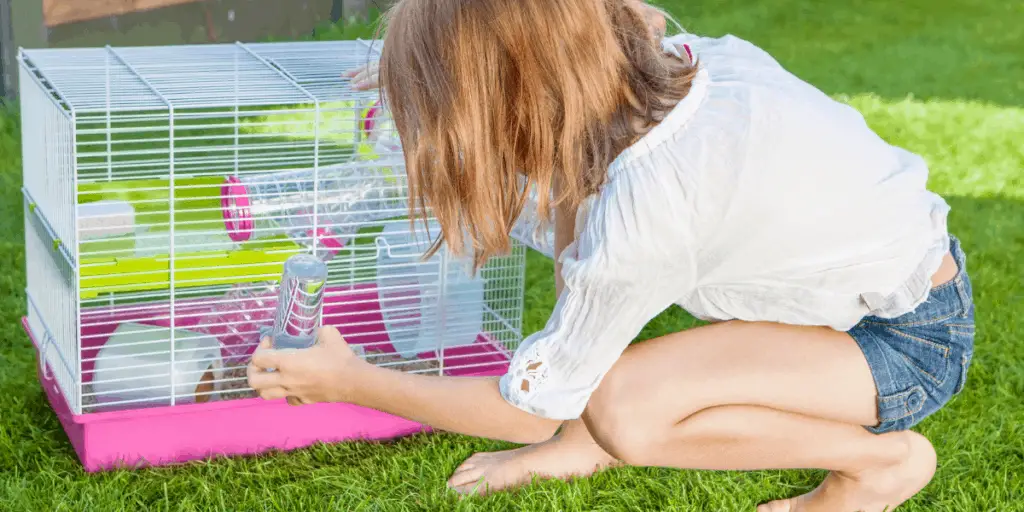When getting a pet hamster, it’s easy to cover essential requirements like diet, sleep, and exercise as there is plenty of information available online for these topics. Something you might not have considered in depth though is whether or not hamsters need sunlight.
This is because hamsters are nocturnal and while you might have noticed them sleeping at odd hours during the day whilst being very active at night (hamsters on a wheel at night is a very common occurrence), you might not have considered whether or not they need sunlight.
So, do hamsters need sunlight?
Hamsters are very sensitive to light and should be kept out of direct sunlight at all times. While you shouldn’t put a hamster in direct sunlight, you should still ensure they are kept in a room that has some natural light as they see best with low levels of light. Hamsters are also nocturnal so they need natural light to distinguish between night and day and ultimately regulate their sleep cycle based on this.
As hamsters are nocturnal, their needs in terms of sunlight and darkness are very much different from our own and it’s therefore important to cater to their needs and ensure their living environment is as close to their natural habitat as possible.
Looking for a Hamster cage? Take a look at our top recommendation on Amazon here ↗️
Table of Contents
Do Hamsters Need Sunlight
Hamsters do need some form of natural light in order to regulate their sleep cycle. While you could use artificial lights to simulate day and night, we’d want our hamsters to live as they would when out in their natural habitat and this means that access to natural light is best.
Placing your hamster in a well-lit room is the best way to ensure they are comfortable and sleep well.
While humans still use light and dark to dictate sleep according to our circadian rhythms, we also have the benefit of a clock that tells most of us when to go to bed and when to wake up each morning.
Hamsters do not have this privilege and therefore use natural light to dictate their sleeping regime.
This is even more important as hamsters are nocturnal so while some might come out at times during the day, it will mostly be around dusk or dawn during times of low light levels.
While they may not need direct sunlight (which we’ll cover shortly), a well-lit room from natural light is almost a necessity for hamsters.
Is Direct Sunlight Bad for Hamsters
Direct sunlight is not recommended for most hamsters, they are very sensitive to light, and bright sunlight can make them uncomfortable, too hot, damage their eyes, and interfere with their sleep cycle.
Some hamsters do however like to bask in some sunlight for the warmth and vitamin D benefits, though we don’t think they are doing it intentionally for vitamin D!
A good time to expose your hamster to some fresh air and daylight is just after dawn, the sun will not be at its brightest and your hamster can then enjoy the sun and fresh air whilst in ideal low-light conditions.
In terms of positioning your hamster’s cage in the house, it should always be kept out of direct sunlight.
If your hamster is placed in direct sunlight during the day they will find it difficult to sleep as a result of the heat, which will then have a negative knock-on effect.

Keeping a hamster in a well-lit room of natural light is not a problem though. Hamsters will typically burrow when sleeping during the day and any daylight in the room will not impact them.
It will have the opposite effect and actually be beneficial in helping them to regulate their sleep cycle.
Hamster Sunlight and Sleep
As mentioned earlier, hamsters are nocturnal creatures and sleep during the day for the most part whilst being more active during the night. As owners, we might be tempted to cover the hamster’s cage or blackout the room during the day in order to give them a better sleeping environment.
This would, however, not be necessary and could actually cause your hamster more inconvenience that it would comfort. Whilst humans like to sleep in darkness, this is the way we have evolved and hamsters have very different requirements.
Covering a hamsters cage during the day or putting them in a dark room would heavily impact their natural sleep cycle as they use the levels of light in a room to distinguish between day and night in order to internally regulate their sleep cycle.

It’s therefore important to provide your hamster with a regular routine in terms of light. What this essentially means is that the lighting for a hamster should be constant on a daily basis and should not change erratically from day to day.
If for example, you keep your hamster in the living room, there will be light from the tv, lamps, other electronics, and even ceiling lights and their usage will likely vary from day to day unless you have a very strict bedtime routine yourself.
You should therefore ensure that your hamster is either kept in a room when the changes in light are primarily natural light from outside or you should ensure a regular routine for any artificial lights that you do use around your hamster.
Can Hamsters Have a Nightlight
While hamsters are nocturnal, they don’t have the best eyesight in the dark, despite a common assumption that hamsters can see in the dark. They see best in low light levels and when placed in complete darkness, their eyesight is barely better than that of a human.
People often wonder whether a nightlight is a good idea to help hamsters see during the night and this will depend on a range of factors.
As mentioned earlier, it’s best to keep them in a room where the natural light and darkness are regular so bright artificial lights would not be recommended for a hamster.
A very dim light would be acceptable as long as it doesn’t cause any confusion about when it’s night and day for your hamster. This video above helps to better explain why a nightlight is not necessary.
In Summary
Hamsters do need sunlight in order to regulate their sleeping pattern. As nocturnal animals, they rely on natural light to dictate when they should be asleep and when they should be awake to eat and exercise.
It’s, therefore, best to keep your hamster in a room that is well lit by natural light. Any artificial light should be kept to a minimum. In any instance when you do use artificial light, it’s important to ensure that this is matched by a routine and turned on and off at the same time each day.




